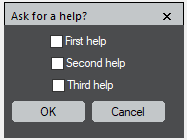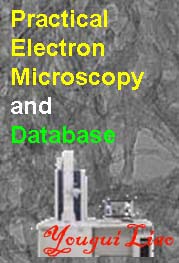| Although all DM scripts are written based on C++ language with many simplifications, there are still some major differences between them, probably due to some simplifications of the software interface behind the scripts. DigitalMicrograph™ (DM) compiler does not fully comply with Standard C++. Therefore, in many cases, direct "translation" from C++ to DM scripts would not work. Due to the limitation of DM, DM cannot be a replacement of C++ compilers. Table 1137a gives some of such examples.
| Table 1137a. Mismatches between working DM scripts and direct "translation" from C++. The directly translated scripts cannot be executed in DM. |
|
In C++ or direct "translation" from C++ |
|
Mismatches |
| Does not use headers |
C++ uses headers, e.g. <cstdlib> header |
|
| Can start a newline with or without a semicolon ";" |
Has to have a semicolon ";" to start a newline |
|
void MyFunction( number x )
{
number EMSum=0; // initialize sum
number EMi, EMCount
for(EMi=1; EMi<=x; EMi++)
{
EMSum = EMSum + EMi;
for(EMCount=0; EMCount<10; EMCount++)
result ("The current sum is " + EMSum + "\n")
}
}
number EMa = 3
MyFunction( EMa )
Script code |
void MyFunction( number x )
{
number EMSum=0; // initialize sum
number EMi, EMCount
for(EMi=1; EMi<=x; EMi++)
{
EMSum = EMSum + EMi;
for(EMCount=0; EMCount<10; EMCount++)
result ("The current sum is " + EMSum + "\n")
}
}
number x = 3
MyFunction( x ) |
x, EMa |
number x
number y
for(x=0; x<=10; ++x)
result (x + "\n")
{
for(y=10; y<8; --y)
result (y + "\n")
} |
number x
number y
for(x=0, y=10; x<=10; ++x, --y)
result (x + "\n")
result (y + "\n") |
|
number x
x = 1
for(x; x < 10; x++)
result (x + "\n")
Script code |
number x
x = 1
for(; x < 10; x++)
result (x + "\n") |
In C++, the initialization section can be moved outside of the loop, and the initialization section has been left blank. |
| return |
return 0 |
DM ignores "0" when it does not return a value |
| Automatically force an expression to be of a specific type |
Needs casts to force an expression to be of a specific type |
|
TagGroup GlobalSino, EMItems
GlobalSino = DLGCreateDialog( "Ask for a help?", EMItems )
TagGroup EMVote1 = DLGCreateCheckBox( "First help ", 0)
TagGroup EMVote2 = DLGCreateCheckBox( "Second help", 0)
TagGroup EMVote3 = DLGCreateCheckBox( "Third help ", 0)
EMItems.DLGAddElement( EMVote1 )
EMItems.DLGAddElement( EMVote2 )
EMItems.DLGAddElement( EMVote3 )
if ( !Alloc( UIframe ).Init( GlobalSino ).Pose() ) exit (0)
if ( 1 == EMVote1.DLGGetValue())
{
Result("Help on FOR in DM\n")
}
if ( 1 == EMVote2.DLGGetValue() )
{
Result("Help on IF in DM\n")
}
if ( 1 == EMVote3.DLGGetValue() )
{
Result("Help on SWITCH in DM\n")
}
Result( "\n\n" )

Script code |
Number a;
Result ("Ask for a help?\n";
Result("10. Help on FOR in DM\n")
Result("20. Help on IF in DM\n")
Result("30. Help on SWITCH in DM\n")
... "Enter choice (10, 20, or 30): ";
switch (a)
{
case 1:
Result ("for is versatile");
break;
case 2:
Result ("IF is conditional");
break;
case 3:
Result ("switch is multiway");
break;
default:
result ("You must enter a number from 10, 20, and 30.\n");
} |
Here presents DM functions similar to that of switch statement in C++.
In DM, there is no switch statement.
For instance, the working DM script shown here is a replacement of switch statement in C++. This script creates a simple "help" system
that describes the meaning of the for, if, and switch statements. It first displays the help topics and then waits for the user to enter a choice. |
number EMi
for(EMi=0; EMi<4; EMi++)
{
if ( 1 == EMi)
{
Result("Help on FOR in DM\n")
}
if ( 2 == EMi)
{
Result("Help on IF in DM\n")
}
if ( 3 == EMi)
{
Result("Help on SWITCH in DM\n")
}
Result( "\n\n" )
}
Script code |
|
Table 1137b. C++ functions, in its library, which are missing on DM. |
C++ |
Examples of alternative solution in DM |
| Function |
|
Function |
|
| rand() |
Computes a random value in the range [0,1) |
random() |
Computes a random value in the range [0,1) |
| kbhit( ) |
This function returns false if no key has been pressed or
true if a key has been struck. The kbhit( ) function is not defined by Standard C++, but is a
common extension that is provided by most compilers. |
!SpaceDown() |
Stop the process if space-bar on the keyboard is pressed. Example |
| goto statement |
No such statements in DM |
| typedef statement |
do {
statements;
} while(expression) |
DM does not support do-while loop. |
| Constructors and destructors can take both 'self' object and variables as arguments |
Constructors and destructors can only take the 'self' object as its argument |
| struct |
DM does not have this
keyword which tells the compiler that a structure declaration, e.g. structure array, is beginning |
strcpy( )
|
DM does not have such String Library Function |
| strcat( ) |
| strlen( ) |
| strcmp( ) |
| pointer: type *var-name (with a "*" sign) |
DM does not support such pointer variables |
| atof( ) |
DM does not have this function |
| malloc( ) |
| free( ) |
| '\n' (newline character) |
"\n" |
| argv parameter |
DM does not have this pointer |
| argc parameter |
DM does not have this parameter |
| reverse( ) |
DM does not have this function |
| labs( ) |
DM does not have this function, which C++ returns the absolute
value of a long |
| fabs( ) |
DM does not have this function, which C++ returns the absolute
value of a double |
| nothrow |
DM does not have nothrow alternative |
| reference |
DM does not have such implicit pointers |
| const |
DM does not have this qualifier |
| swap( ) |
DM does not have this function, which is related to pointers |
| factr( ) |
DM does not have this function -- it is a classic example of recursion. However, this function can be built in DM (page1125) |
| Exception handling: try, catch and throw |
The applications of "exception handling: try, catch and throw" in DM are narrower than those in C++. For instance, catch cannot be used to catch Class Types in DM. |
| Operator overloading |
DM does not allow operator overloading |
| Enumerations/enum |
Not in DM |
auto
extern
register variables
static variables
mutable |
DM does not have such Class Specifiers |
| independent reference |
No "independent reference" in DM |
| Class inheritance |
No class inheritance in DM |
| Virtual functions |
DM does not support virtual functions |
| template function |
DM does not allow users to use "template" as a keyword to create their own functions |
| template class |
DM does not allow users to use "template" as a keyword to create their own classes |
| Parameterized constructor |
DM does not allow parameterized constructors |
& can be associated
with the type name rather (e.g. int& x) or the variable name (e.g. int &x) when a reference rarameter is declared |
& can only be associated
with the variable name when a reference rarameter is declared (page1122) |
| :: |
DM does not have such scope resolution operator |
| >> (shift right) |
DM does not have the Shift Operators |
| << (shift left ) |
| sizeof compile-time operator |
There are 63 keywords currently defined for Standard C++ and C++ is a case-sensitive
language, for instance, "return" is not the same as "RETURN". You cannot use any of the C++ keywords, in Table 1137c, as identifier names. On the other hand, you should not use
the name of any standard function, such as abs, for an identifier.
| Table 1137c. C++ and DM keywords. Part one lists the common keywords used in both C++ and DM, while Part two lists the keywords used in C++ only. |
Part one: used in both C++ and DM |
| for |
if |
while |
else |
| return |
continue |
void |
break |
| Exception handling |
| try |
catch |
throw |
|
| Compound data types |
| class |
|
|
|
| |
Part two: used in C++ only |
| Compound data types |
| array |
struct (for structure) |
union |
|
| Functions |
| friend |
|
|
|
| |
|
|
|
| public |
inline |
this |
template |
| new |
delete |
|
|
| auto |
enum |
operator |
switch |
| asm |
using |
virtual |
mutable |
| bool |
explicit |
private |
true |
| double |
export |
protected |
volatile |
| case |
extern |
signed |
typedef |
| dynamic_cast |
false |
register |
typeid |
| char |
float |
reinterpret_cast |
typename |
| do |
namespace |
sizeof |
int |
| const |
default |
short |
unsigned |
| const_cast |
goto |
long |
wchar_t |
| static |
static_cast |
|
|
Table 1137d. Comparison of stream in DM and C++. |
|
Function |
C++ |
DM |
| Availability to programers |
|
Predefined streams |
| cin |
The stream is associated with standard input |
Yes |
No |
| cerr |
The stream is associated with
standard output. The
difference between these two streams is that clog is buffered, but cerr is not. Therefore, any output sent to cerr is immediately output, but output to clog is
written only when a buffer is full. cerr and clog are typically streams to which
program debugging or error information is written. |
| clog |
Wide (16-bit) character versions of standard streams |
| wcin |
These streams exist to support all languages, such as Chinese,
that require large character sets. |
Yes |
No |
| wcout |
| wcerr |
| wclog |
Template class hierarchies |
| basic_ios (e.g. ios_base) |
This is the most commonly used class hierarchy. This is a high-level I/O
class that provides formatting, error checking, and status information related to stream
I/O. The ios_base, defines several non-template
traits used by basic_ios. basic_ios is used as a base for several derived classes, including
basic_istream, basic_ostream, and basic_iostream. These classes are used to create streams capable of input, output, and input/output, respectively. |
Yes |
No |
| basic_streambuf |
This class is derived from the low-level I/O class, and supplies the basic, low-level input and output operations, and provides the underlying
support for the entire C++ I/O system. Unless you are doing advanced I/O programming,
this class is not directly needed. |
Yes |
No |
|
